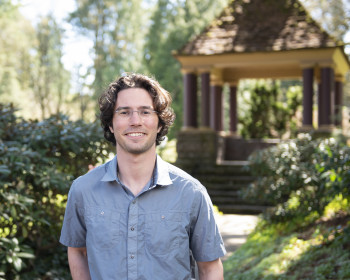Lewis & Clark Awarded $750,000 Mellon Foundation Grant
by Scout Brobst BA ’20
This past March, the Andrew W. Mellon Foundation granted Lewis & Clark $750,000, directly following the tenure of the college’s previous Mellon Foundation grant for teaching, awarded in 2016. The new project, “Healing Social Suffering Through Narrative,” will involve a series of partnerships between the college and the greater Portland area, allowing students and faculty to apply the study of the humanities and arts in general, and the use of narrative in particular (including ethnographies, journaling, storytelling, and oral histories), to promote healing in the broader community.
The Mellon Foundation, established in 1940, is recognized nationwide for its emphasis on human flourishing through the arts and humanities. According to Professor of Psychology Jerusha Detweiler-Bedell, the faculty director of the project, the foundation’s interest in funding community collaborations provided a timely opportunity for a new proposal.
“I really wanted, as we were building the broader health studies initiative, to demonstrate how the arts and the humanities play a crucial role in health and well-being, not only in academic studies but in applied ways,” says Detweiler-Bedell. “Narrative—the idea of expression through writing, through performance, through song—could be a powerful tool for healing.”
Over the four years of funding, Lewis & Clark will address the idea of “social suffering” through organizational partnerships, both established and prospective. The ultimate goal is to foster mutually beneficial, collaborative relationships between the college and the Portland community, using a humanistic approach in all acts of service.
It is a goal that dovetails neatly with the recent creation of a health studies minor, also led by Detweiler-Bedell. A component of the minor is narrative representations of wellness and disease, and faculty will now be able to design or adapt courses to engage in these partnerships with grant funding.
One of the community partnerships will be with the Northwest Narrative Medicine Collaborative (NWNMC), an organization devoted to exploring narrative as it relates to illness, healing, and care taking, and who has identified a need for narrative scribes for individuals with mental or physical disabilities.
“NWNMC turns on its head the traditional idea of having a medical scribe in a hospital setting writing down the patient’s symptoms,” Detweiler-Bedell says. “Instead, it’s having patients and their caregivers write about their personal experiences in order to make better sense of what they’re experiencing and to promote healing.”
Another established partnership is an expansion of an existing relationship Lewis & Clark has with the Columbia River Correctional Institute through the Inside-Out Prison Exchange. That partnership is led by Associate Professor of History Reiko Hillyer. Here, funding will be applied to provide more college faculty the training necessary to become Inside-Out instructors, helping to close the gap between demand and capacity.
Other partnerships include mentorships with Roosevelt High School students and writing workshops with the nonprofit Write Around Portland.
While some programs at colleges and universities may be on pause with the spread of COVID-19, Detweiler-Bedell believes that our current conditions have exposed the real need for the mission of the project.
“Our timeframe has changed somewhat, with this coming year focused on putting pieces together and planning,” she says. “Now with coronavirus and social distancing, I really feel that, although heart-wrenching, one thing is clear: we’re going to need a focus on healing social suffering more than ever.”
More Newsroom Stories
Public Relations is located in McAfee on the Undergraduate Campus.
MSC: 19
email public@lclark.edu
voice 503-768-7970
Public Relations
Lewis & Clark
615 S. Palatine Hill Road MSC 19
Portland OR 97219

